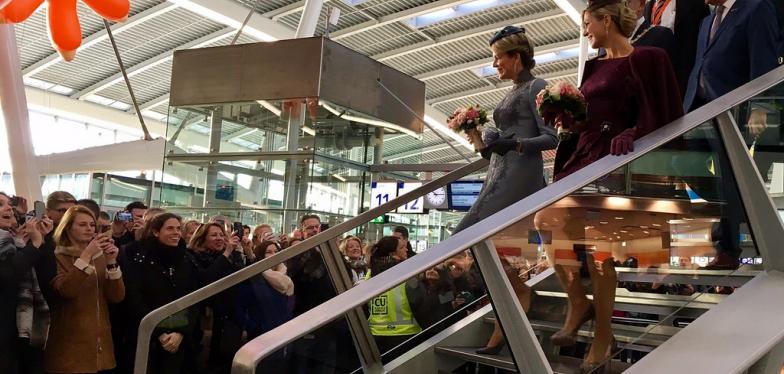Royal Visit of the Utrecht Train Station Rebuilt by Besix
On November 30, during a visit to the Netherlands, Queen Mathilde of Belgium and Queen Maxima of the Netherlands inaugurated Utrecht Centraal train station, developed by Belgian construction conglomerate Besix.

Utrecht Centraal train station is a strategic point in the Netherlands’ rail network. Besix was commissioned by Prorail, the Dutch public body responsible for managing the country’s rail infrastructure, to perform all the construction works and the partial renovation of the station’s 25,000 m2 concourse, which draws 100 million travellers each year. The renovation work began in 2010 and is now complete. The total construction cost adds up to 150 million euros.
The new Utrecht Centraal train station is a modern building made of steel and glass, with a wave-shaped roof that allows the greatest possible amount of natural light to pass through. Travellers have all the necessary amenities at their disposal: stores, hotel and restaurant services, elevators, and escalators. The station is located at the centre of a multimodal public transport hub, where commuters can access trains, motorbuses, and – soon – a tramway.
Utrecht Centraal remained open throughout the renovation period. This represented an impressive technical achievement, given the stream of 230,000 travellers that flow through the station on a daily basis. Jeroen Philtjens, Director of Besix Nederland, proudly declared: “The key to our team’s success was the energy and devotion they constantly displayed, both on ordinary days and during the many weekends and work-nights. For this project, we could also rely on the experience we gained working on other complex railway projects in the Netherlands, in particular the Barendrecht train station and rail tunnel, the Amsterdam Bijlmer Arena station, and the Tilburg station.”
The inauguration of the Netherlands' largest train station took place in the brand new concourse, where the two Queens arrived aboard the royal train. Many of those in charge of the project were present, including Johan Beerlandt, CEO of the Besix Group.
Besix is the largest Belgian group working on the construction of buildings, infrastructure, and environmental and industrial construction projects. It also operates in the areas of mineral extraction, facility management, real-estate development, and concessions. It has established itself as a multi-service group, from the design stage to the building and operating stages. Founded in 1909, it has experienced impressive growth in recent years. In 2014, Besix posted profits of 2 billion euros. The group employs nearly 18,000 people in 22 countries spanning 5 continents.